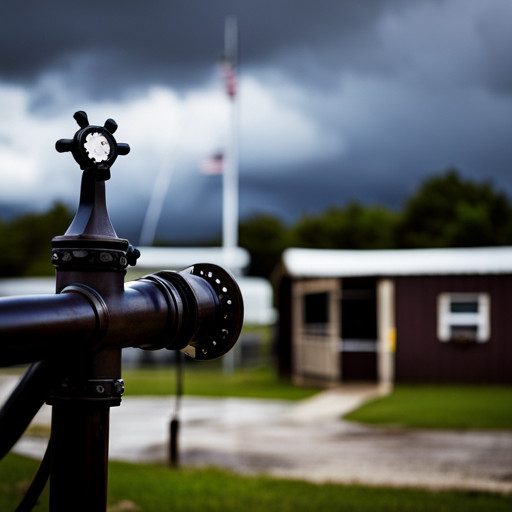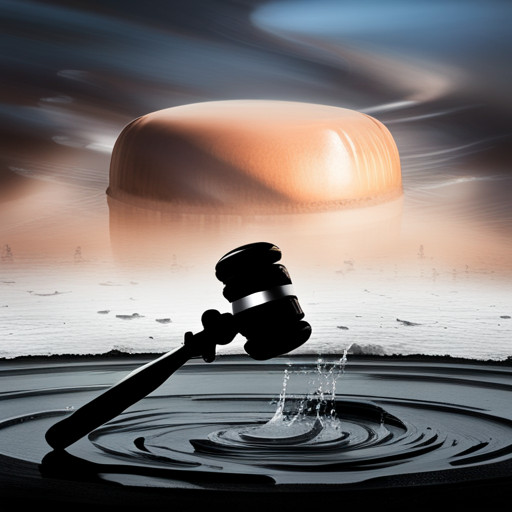Shocking Cancer Diagnoses Camp Lejeune Water Contamination Exposed
Like a silent predator, water contamination at Camp Lejeune has wreaked havoc, leading to increased cancer diagnoses among Marines.

This article unveils the depth of this tragedy, explores the role of media in its discovery, and investigates the implications of the Camp Lejeune Justice Act.
Personal narratives, the connection to Parkinson's disease, and the part played by personal injury law firms in securing justice for victims are explored within this comprehensive review.
Key Takeaways
- Media coverage of the Camp Lejeune water contamination crisis is raising awareness among survivors of Marines with cancer.
- The Camp Lejeune Justice Act allows Marines, civilian employees, and family members to file water contamination lawsuits, lifting the statute of limitations.
- Diseases linked to Camp Lejeune water contamination include leukemia, aplastic anemia, multiple myeloma, Parkinson's disease, and other neurological disorders.
- The Camp Lejeune Justice Act has faced delays, causing additional problems for Marine veterans.
Unveiling the Camp Lejeune Water Contamination Tragedy

The tragedy of the Camp Lejeune water contamination was unveiled through media coverage, highlighting the shocking diagnoses of otherwise healthy Marines with no family history of cancer, thus raising awareness among survivors and prompting consideration of lawsuits.
Uncovering the depth of this tragedy was a complex process, achieved through relentless investigative journalism and survivors' determination to seek justice. Media coverage played a crucial role in influencing public perception and awareness, thereby exposing the extent of the water contamination.
This exposure led to an increased quest for justice, as victims embarked on legal battles against the responsible parties. The impact of this media coverage on awareness cannot be overstated, as it propelled the tragedy of Camp Lejeune water contamination to the forefront of public discourse.
The Role of Media Coverage in Uncovering the Crisis

Increased media attention has played a pivotal role in spotlighting the hazardous conditions at the military base. This has led to a surge in public awareness about the potential health risks associated with the crisis.
Particularly in North Carolina, local media outlets have been instrumental in running stories about Marines who developed cancer due to toxic tap water.
The role of media coverage in raising awareness has not only informed the public but also encouraged victims to consider the potential for legal action.
This increased visibility has had a profound impact on legal proceedings. It has led to the introduction of the Camp Lejeune Justice Act. This legislation lifts the statute of limitations, enabling those affected to file lawsuits.
This demonstrates the tangible impact of media coverage on legal action.
Understanding the Camp Lejeune Justice Act and Its Impact

Enactment of the Justice Act has provided a legal avenue for Marines, civilian employees, and their family members to seek compensation for health complications linked to toxic exposure at the military base. The significance of lifting the statute of limitations is profound:
- The Act allows for the filing of lawsuits irrespective of when the exposure occurred, creating a sense of justice for the victims.
- Furthermore, it acknowledges the long term health effects on survivors, highlighting the severity of the issue.
Long-term effects include:
- Neurological disorders
- Multiple types of cancer
This legislation represents a significant step forward in addressing the tragic aftermath of the Camp Lejeune contamination incident, providing a beacon of hope for affected individuals.
Latest Developments in Camp Lejeune Water Lawsuits

Recent developments in litigation related to toxic exposure at the military base reveal an uptick in filed lawsuits, indicating a growing awareness among affected individuals about their legal rights.
This surge in legal action stems from the financial impact on families affected by Camp Lejeune water contamination, as they grapple with mounting medical bills and loss of income.
The toxicants present in the water supply, including trichloroethylene (TCE), tetrachloroethylene (PCE), vinyl chloride (VC), and benzene, have been linked to serious health issues.
The potential long-term health effects for survivors of Camp Lejeune water contamination include leukemia, aplastic anemia, multiple myeloma, and neurological disorders such as Parkinson's disease.
These health implications further exacerbate the financial strain on affected families.
Personal Stories: Survivors Share Their Experiences

Personal accounts from survivors offer a poignant insight into the hardships and struggles faced by those adversely affected by the environmental health crisis. Survivor testimonials highlight the long term health effects, painting a vivid picture of the realities of living with diseases linked to water contamination at Camp Lejeune.
These accounts reveal:
- The onset of unexpected health issues, such as cancer and neurological disorders.
- The shock and disbelief experienced upon diagnosis.
- The struggle for diagnosis due to the latency of symptoms.
- The burden of medical expenses and ongoing treatment.
- The emotional and financial strain on families.
- The pursuit of legal recourse for compensation.
- The fight for recognition and justice.
- The role of media in raising awareness.
- The impact of legislation, such as the Camp Lejeune Justice Act, on their journey for justice.
The Health Impact on Children Born at Camp Lejeune

Transitioning from the compelling personal narratives of survivors to the broader health implications, the focus now shifts to the impact on children born at Camp Lejeune. The health risks associated with exposure to the contaminated water at an early age are of significant concern.
Investigations into the long term effects of the contamination reveal a heightened susceptibility to developing various forms of cancer. These findings underscore the seriousness of the contamination, extending beyond immediate health complications to potential lifelong ailments.
Moreover, the implications of these findings are far-reaching, impacting not only the survivors but also subsequent generations. This emphasizes the necessity for rigorous research into the health risks and long term effects of contamination exposure on this vulnerable demographic.
Navigating the Delays and Challenges With the Camp Lejeune Justice Act

Navigating the complexities of the Justice Act has proven challenging and time-consuming for many affected by the environmental crisis at the Marine base. The Act, despite its potential for financial assistance for victims, presents numerous obstacles in the compensation process.
- Delays and Challenges
- The Act has faced multiple delays, causing additional distress for Marine veterans.
- A committee of attorneys has been appointed to expedite claims.
- Payouts are not expected to be quick, further complicating the financial situation for affected families.
- Camp Lejeune Widows
- Widows are seeking justice for deaths caused by water contamination.
- A fear exists that death from water poisoning may leave families in financial hardship.
- Legal Assistance
- Law firms with experience in similar claims are offering no-cost, no-obligation claim reviews to assist victims through the process.
The Link Between Parkinson’s Disease and Camp Lejeune Water Contamination

Having addressed the hurdles encountered in implementing the Camp Lejeune Justice Act, the focus now turns to the correlation between Parkinson's disease and water contamination at Camp Lejeune. Research has linked long term effects of water contamination to an array of health complications, including neurological disorders such as Parkinson's disease. The disease is characterized by a set of distinct symptoms, which may be exacerbated by exposure to toxic water.
The table below provides a snapshot of some Parkinson's disease symptoms that have been observed in victims exposed to the contaminated water at Camp Lejeune:
| Parkinson's Disease Symptoms | Description |
|---|---|
| Tremors | Involuntary shaking, often starting in the hands |
| Rigidity | Stiffness in the body, limiting range of motion |
| Bradykinesia | Slowness in voluntary movement |
| Postural instability | Difficulty balancing, leading to falls |
| Cognitive Impairment | Decline in memory and thinking skills |
Such findings necessitate more comprehensive studies on the long-term effects of water contamination.
Seeking Legal Help: The No-Cost, No-Obligation Claim Review Process

The Role of Personal Injury Law Firms in Championing Justice for Victims

Personal injury law firms play a critical role in securing justice for victims of environmental crises. They often provide the necessary resources and expertise to effectively pursue litigation. The role of attorneys in these organizations is pivotal. They navigate through complex legal processes to ensure victims of tragedies like the Camp Lejeune water contamination receive due compensation.
Lawyers in these firms conduct detailed investigations, uncover crucial evidence, and construct compelling legal arguments. Their expertise allows them to challenge powerful entities, such as the Marine Corps, and hold them accountable for their negligence.
Through their relentless efforts, these law firms assist in securing compensation for victims. This helps to mitigate the financial burdens imposed by medical expenses and other damages resulting from the environmental crisis.
Frequently Asked Questions
How Were the Toxic Chemicals Introduced Into the Water Supply at Camp Lejeune?
Contamination sources introduced into Camp Lejeune's water supply were primarily industrial solvents and fuels. Health implications include numerous cancer diagnoses, attributable to chemicals such as trichloroethylene, tetrachloroethylene, vinyl chloride and benzene found in the water.
What Actions Has the Marine Corps Taken in Response to the Water Contamination Crisis?
In response to the water contamination crisis, the Marine Corps has demonstrated accountability by implementing contamination prevention measures, including stringent water testing protocols, and supporting legislative initiatives like the Camp Lejeune Justice Act for affected individuals.
Are There Any Ongoing Efforts to Clean up the Water Contamination at Camp Lejeune?
Efforts to remediate the water contamination at Camp Lejeune are ongoing, yet face significant challenges due to the extensive impact of the contamination. This involves removal of toxic substances and monitoring of water quality.
How Were the Diseases Linked to the Water Contamination at Camp Lejeune Scientifically Established?
Disease detection methods employed in the Camp Lejeune case involved thorough epidemiological studies, correlating exposure to identified contaminants with subsequent health effects, thus scientifically establishing links to diseases such as leukemia, Parkinson's, and other disorders.
What Resources Are Available for Marines Who Are Not Financially Able to File a Lawsuit?
Veteran Assistance Programs offer financial support for marines unable to afford lawsuit costs. Additionally, Pro bono Legal Aid services provide free legal representation, ensuring all victims of Camp Lejeune water contamination can seek justice.

This post has been generated by AI and was not reviewed by editors. This is Not legal advice. Please consult with an attorney.




